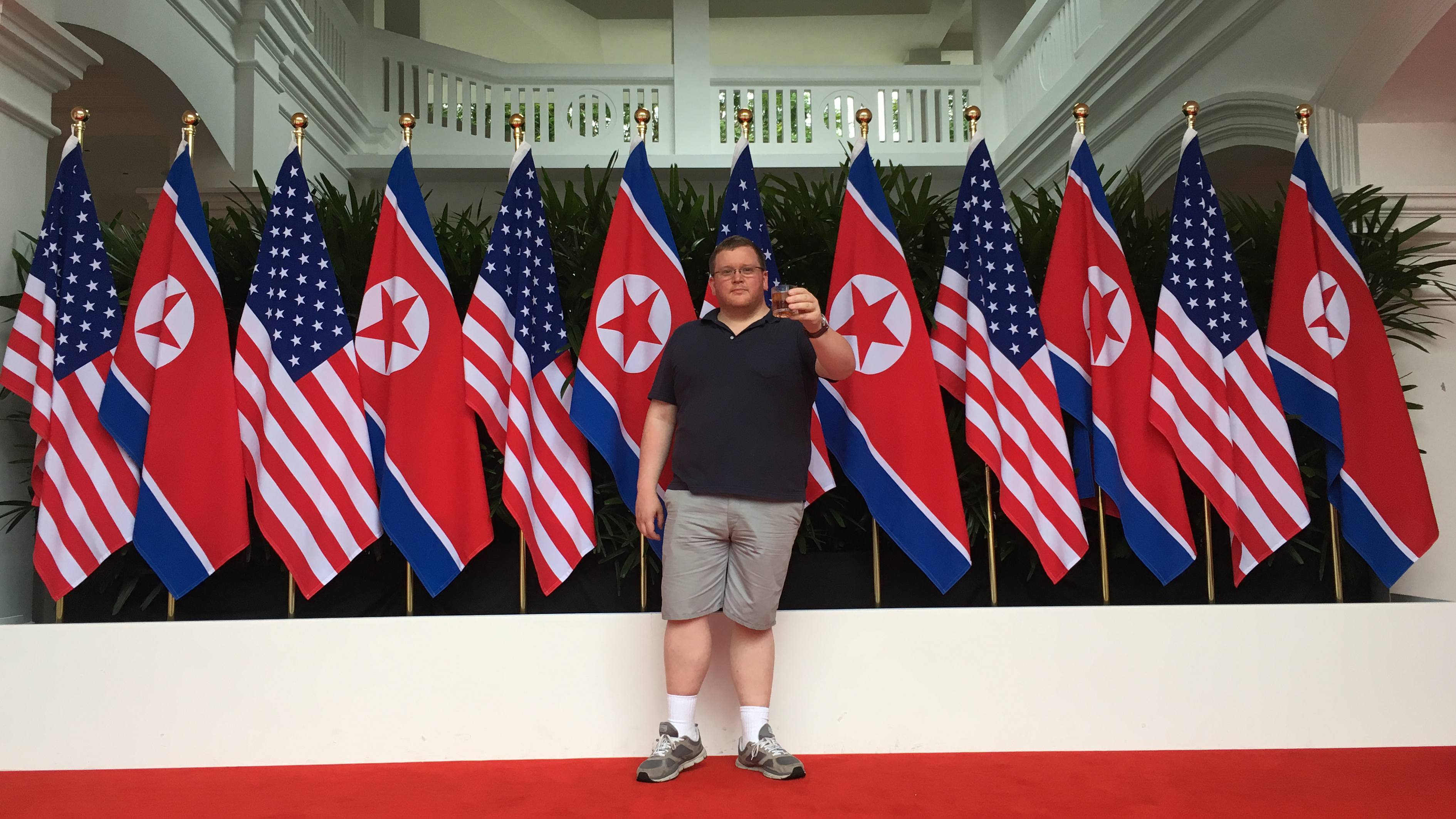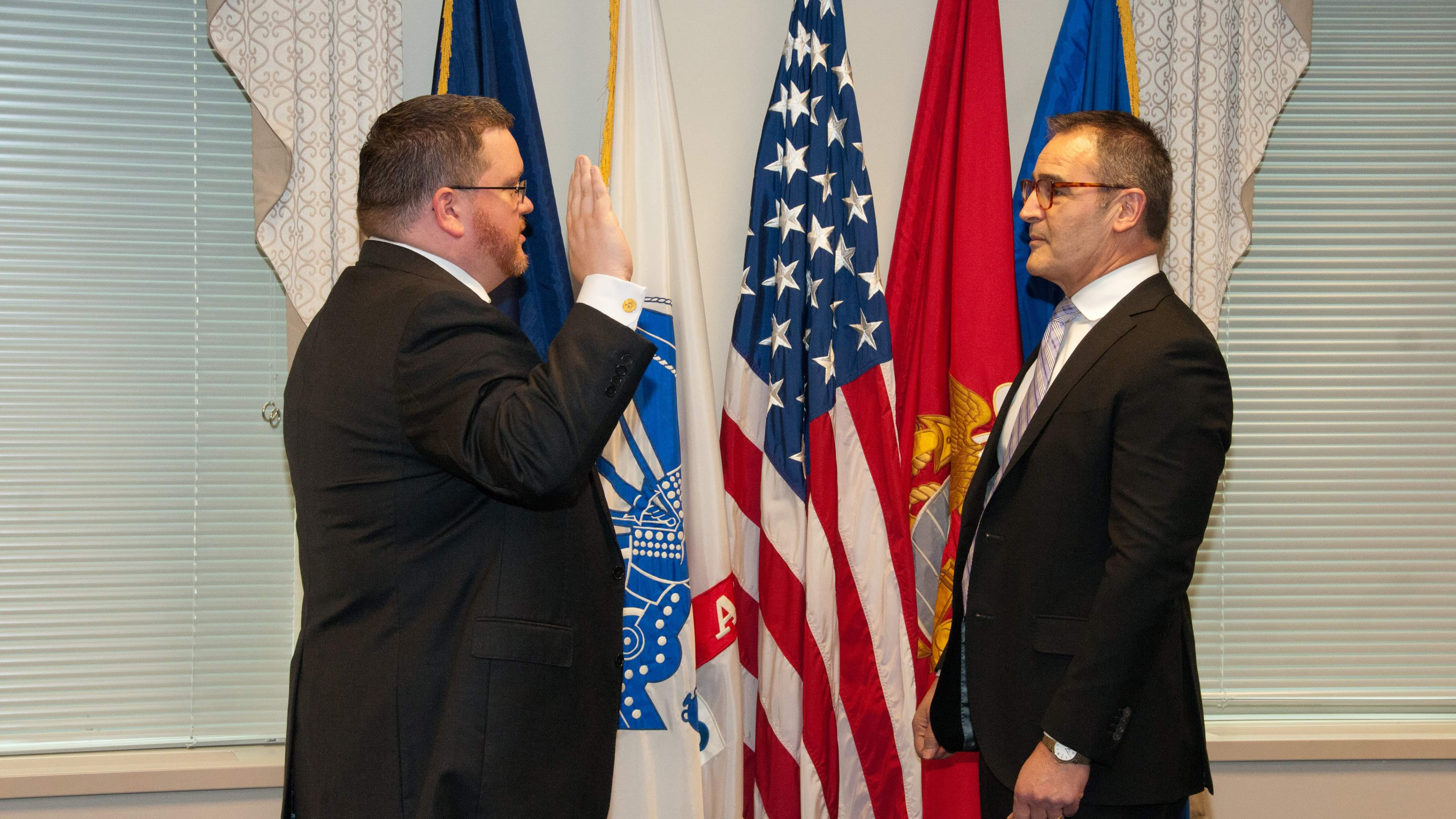- Jon Mark Beilue
- Alumni
- Featured
- History
Beilue: Keeping an eye on North Korea
WT gave start for nomadic student turned special adviser for DOD
Photo: Anthony Holmes, left, is sworn in as special adviser for North Korea.
Twenty years ago, Anthony Holmes arrived at West Texas A&M after enrollment in 32 different schools and graduating from a high school in West Virginia that no longer exists. Never at one place long enough to really develop a focused field of study, Holmes began as a psychology major because that held some interest.
“I was just trying to check off all the boxes to make sure I graduated high school,” Holmes said. “I had no clue what I would end up doing.”
Not exactly the Ivy League, well-heeled background that would typically lead to 10 years working for the Defense Intelligence Agency, then as special advisor on North Korea in the office of Secretary of Defense for four years. There, he led a team that helped develop U.S. policy with North Korea for the White House as part of the 2018 U.S.-North Korea Summit in Singapore.
“We all know the world can be unfair, that if you went to school where you have an Ivy League diploma on the wall, certain doors will be open to you and not to others,” said Dr. Bruce Brasington, WT’s Twanna Caddell Powell Professor of History, “but Anthony showed that’s not always true.”
If anything, Holmes’ expertise when coming to WT was in U.S. geography. For a non-military family, he, his parents, two brothers and a sister were like a living breathing Rand-McNally map. It was state after state after state. Some of it was because of brother Chris, who was seriously diabetic, and moving for innovative treatments and a lower cost of living to afford them.
“But there was always wanderlust too,” Holmes said. “We could not stay in one place. I was in fourth grade living in Nebraska. I came home from school and was told we were moving to Florida. We’d only been there three months, but Florida was going to be our future.”
One of his father Doug Holmes’ many moves was to Canyon shortly after Anthony graduated from high school. He got a position at the Clements Unit, the maximum-security prison northeast of Amarillo. Anthony knew he wanted to go to college. He didn’t know exactly what he’d do once there, but he was going.
He applied and was accepted at several in Texas, but decided to go the closest and cheapest route and to WT. It changed his life.
Soon enough, he gravitated toward history and political science. In his words, he was “hanging around” political science professors Reed Welch and Dave Rausch, and history professors Paul Clark and Brasington.
“I thought, ‘Wow, these are my people here,’” Holmes said. “It was not long that I switched my major to history and political science.”
About the same time, he had a one-hour talk with Dr. James Hallmark, then Vice-President of Academic Affairs, and pleaded his case to get into the honors program though nothing in his immediate background earned that. He got in on a trail basis. Because of that, he moved into Connor Hall, the honors program dorm.
“Hands down, the best experience of my life,” Holmes said. “I lived with some of the best people I ever met. Plus, being there for about four years, it was by far the longest I had ever lived in one place in my life.”
Brasington had Holmes for several classes and saw a student hungry for knowledge and not satisfied with getting by.
“He was always wanting to learn more and pushing himself,” Brasington said. “He wasn’t somebody motivated by grades as much as wanting to improve. That sounds corny but that was absolutely true. He was inquisitive, energetic, and he stimulated everyone around him.”

Photo: Anthony Holmes traveled to Singapore for the historic summit between President Trump and Kim Jong-un in 2018.
Go (Far) East, young man
His future took a sharp and direct turn almost by accident. Two friends were trying to get Clark to teach a pilot Japanese language program. They needed at least 10 to sign up for the course for it to make.
“They told me you don’t have to take it – just sign up for it,” Holmes said. “I signed up for it, took the course, and loved it.”
That eventually led working with Clark on three grants to study at J.F. Oberlin University in Machida, Japan, a Tokyo suburb. To afford to go, he needed all three, not just two. He got all three, and studied Japanese language and literature.
Following that study, he graduated from WT in 2007, and then earned his master’s at the University of Pittsburgh’s renowned National Center for Japan Studies. From there, he interned at and soon got a full-time position with the Defense Intelligence Agency.
The DIA is one of the nation’s three sources of intelligence gathering, in addition to the State Department and the more widely known CIA. Much of what Holmes did was and still is classified, but his focus largely was on Northeast Asia. He did current and crisis intelligence, and was on duty when North Korean Supreme Leader Kim Jong-il died in 2011.
Holmes went on to earn a second masters – this time in national security and strategic studies with certification in military planning at the Naval War College in Newport, R.I. Through networking at the DIA, Holmes was hired at the outset of the Trump administration as a special adviser on North Korea in the office of the Secretary of Defense.
North Korea has long been the most mysterious, most closed and, with its nuclear arsenal, possibly the most dangerous country in the world. Holmes uses the description of “hermit kingdom,” coined about a century ago to describe the country.
“North Korea is pretty much a monarchy led by the Kim dynasty, so that’s the ‘kingdom’ part,” Holmes said. “The ‘hermit’ part comes from how closely information is controlled coming into and out of the country.”
Holmes said North Korea’s end game won’t change, but it is unpredictable in how it wants to achieve that. The Kim monarchy has long wanted to end the U.S.-South Korea alliance, the U.S.-Japan alliance – where between the two countries there more than 80,000 U.S. troops – and recognize North Korea’s claim over the entire peninsula. None of that will happen.
The unpredictable are the tactics – testing short-range missiles just last week, clandestinely crossing into South Korea to plant mines, the sinking of a South Korean warship. Volatile and dangerous — but that’s not all.
“North Korea feels so alien,” Holmes said. “They are the most horrendous abuser of human rights on the planet. They are a grotesquely abusive country.”
When brought in to the office of Secretary of Defense, Holmes worked on North Korean policy review. He led a team of 70 on the civilian side to craft a newer policy on how to handle North Korea. There were 18 proposals that the White House refined to eventually three that were submitted to then-President Trump. That ultimately became the Maximum Pressure campaign.
“It basically said that the U.S and its allies would use every realistic tool of state power to convince North Korea that its possession of nuclear weapons made North Korea less safe, not more,” Holmes said.
Holmes was one of two from the Department of Defense at the U.S.-North Korea summit in 2018 in Singapore with Trump and Kim Jong-un. It was the first-ever meeting between the two countries leaders.
That was pretty tall cotton for a former WT student who was briefly a psychology major 20 years ago.
Holmes was part of the transition that happens when there is a new presidential administration. He, like many, is job hunting in what is usually a 60-day search for outgoing administration teams. In the meantime, he has written for journals on North Korea relations, critical of what he terms are “golden concessions” to unnecessarily appease the dictatorial nation.
“I’m looking forward to the next phase and next assignment,” he said.
Do you know of a student, faculty member, project, an alumnus or any other story idea for “WT: The Heart and Soul of the Texas Panhandle?” If so, email Jon Mark Beilue at jbeilue@wtamu.edu.

